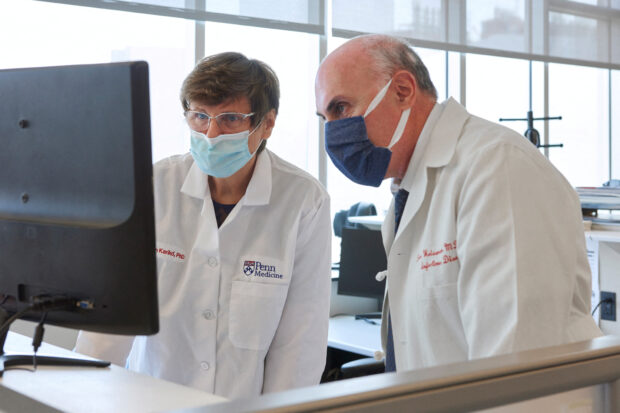Hungarian, US scientists win medicine Nobel for COVID-19 vaccine discoveries

Penn Medicine scientists Katalin Kariko and Drew Weissman, who won the 2023 Nobel Prize in Physiology or Medicine for discoveries enabling the development of mRNA COVID-19 vaccines, look at a computer monitor in an undated photograph at the University of Pennsylvania in Philadelphia, Pennsylvania, U.S. (Peggy Peterson Photography/Penn Medicine/Handout via REUTERS/File photo)
STOCKHOLM – Hungarian scientist Katalin Kariko and U.S. colleague Drew Weissman, who met in line for a photocopier before making mRNA molecule discoveries that paved the way for COVID-19 vaccines, won the 2023 Nobel Prize for Medicine on Monday.
“The laureates contributed to the unprecedented rate of vaccine development during one of the greatest threats to human health in modern times,” the Swedish award-giving body said in the latest accolade for the pair.
The prize, among the most prestigious in the scientific world, was selected by the Nobel Assembly of Sweden’s Karolinska Institute medical university and comes with 11 million Swedish crowns (about $1 million) to share between them.
Kariko, a former senior vice president and head of RNA protein replacement at German biotech firm BioNTech, is a professor at the University of Szeged in Hungary and adjunct professor at the University of Pennsylvania.
In an interview after the award, she said her mother had speculated each year that she might win the Nobel – to which she would remind her there was a time when she could not even get a grant for her research.
Article continues after this advertisement“She (my mother) said, ‘but you work so hard’. And I told her that many, many scientists work very, very hard,” Kariko added.
Article continues after this advertisementCo-winner Weissman is professor in vaccine research at Pennsylvania. “It’s an incredible honour,” he said. “We couldn’t have come to the result without both of us being involved.”
The two laureates in 2005 jointly developed so-called nucleoside base modifications, which stop the immune system from launching an inflammatory attack against lab-made mRNA, previously seen as a major hurdle against any therapeutic use of the technology.
BioNTech said in June that about 1.5 billion people across the world had received its mRNA shot, co-developed with Pfizer. It was the most widely-used shot in the West.
COVID HEROES
“Together they have saved millions of lives, prevented severe COVID-19, reduced the overall disease burden and enabled societies to open up again,” said Rickard Sandberg, member of the Nobel Assembly at Karolinska Institute.
After a biochemistry doctorate in Szeged, Kariko moved to the U.S. in 1985 with her husband and daughter Susan Francia, who became a U.S. national rower and Olympic gold winner.
At the University of Pennsylvania, she tried to turn mRNA into a treatment tool throughout the 1990s but struggled to win grants because work on DNA and gene therapy captured most of the scientific community’s attention at the time.
Kariko has said she endured ridicule from fellow faculty members for her dogged pursuit, which led to her demotion. Taunting continued, she said, when she joined BioNTech in 2013 because the firm did not even have a website at the time.
Weissman received his doctorate from Boston University in 1987 and joined the University of Pennsylvania in 1997.
The two have said they met in 1998 while waiting for rationed photocopying machine time. The ensuing chat piqued immunologist Weissman’s interest in Kariko’s RNA work.
“It is absolutely right that the ground-breaking work on RNA led by Kariko and Weissman should be recognised by a Nobel Prize,” said Sir Andrew Pollard, an immunology professor at Oxford University, who pursued a different technology when co-developing the lesser-used COVID vaccine by AstraZeneca.
The award comes even as Germany’s CureVac, which failed to bring a COVID shot to market, as well as rival Moderna, are separately suing BioNTech and Pfizer for alleged mRNA patent infringements.
BioNTech and Pfizer, in turn, have launched legal challenges against the validity of the intellectual property rights in question.
PANDEMIC BREAKTHROUGH
Messenger or mRNA, discovered in 1961, is a natural molecule that serves as a recipe for the body’s production of proteins. Use of man-made mRNA to instruct human cells to make therapeutic proteins, long regarded as impossible, was commercially pioneered during the pandemic, also by Moderna.
The technology breaks from established biotech medicines, generated in complex reactors by genetically modified living cells, then isolated and purified.
Messenger RNA, by contrast, works like a software that can be injected into the body to instruct human cells to churn out the desired proteins. Prospective uses include drugs against cancer and vaccines against malaria, influenza and rabies.
The medicine prize kicks off this year’s Nobel awards with the remaining five to be unveiled in coming days.
The prizes, first handed out in 1901, were created by Swedish dynamite inventor and wealthy businessman Alfred Nobel.
Last year’s medicine prize went to Swede Svante Paabo for sequencing the genome of the Neanderthal, an extinct relative of present-day humans, and for discovering a previously unknown human relative, the Denisovans.
Other past winners include Alexander Fleming, who shared the 1945 prize for the discovery of penicillin, and Karl Landsteiner in 1930 for his discovery of human blood groups.
gsg
For more news about the novel coronavirus click here.
What you need to know about Coronavirus.
For more information on COVID-19, call the DOH Hotline: (02) 86517800 local 1149/1150.
The Inquirer Foundation supports our healthcare frontliners and is still accepting cash donations to be deposited at Banco de Oro (BDO) current account #007960018860 or donate through PayMaya using this link.